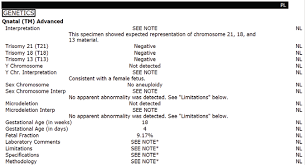
The QNatal Test: Advancing Prenatal Genetic Screening
The QNatal test is a cutting-edge prenatal genetic screening tool that offers expectant parents valuable insights into the genetic health of their unborn baby. This non-invasive test provides accurate information about the risk of certain chromosomal conditions, such as Down syndrome, trisomy 18, and trisomy 13.
Unlike traditional invasive procedures like amniocentesis or chorionic villus sampling (CVS), the QNatal test is a simple blood test that poses no risk to the fetus. It analyzes cell-free DNA circulating in the mother’s bloodstream to detect any abnormalities in the baby’s chromosomes.
Benefits of the QNatal Test:
- Accuracy: The QNatal test has a high accuracy rate in detecting common chromosomal conditions.
- Safety: Being a non-invasive procedure, the test carries no risk of miscarriage or harm to the fetus.
- Early Detection: Results are typically available early in the pregnancy, allowing parents more time to make informed decisions.
- Peace of Mind: The test can provide reassurance to expectant parents and reduce anxiety related to potential genetic issues.
Prenatal genetic screening plays a crucial role in empowering parents with information that can help them prepare for the arrival of their baby. The QNatal test represents a significant advancement in this field, offering a safe and reliable option for identifying potential genetic abnormalities early in pregnancy.
Understanding the QNatal Test: FAQs on Safety, Timing, Accuracy, and Genetic Insights
- What is the QNatal test?
- How does the QNatal test work?
- Is the QNatal test safe for the baby and mother?
- What genetic conditions can the QNatal test detect?
- When is the best time to undergo the QNatal test during pregnancy?
- How accurate is the QNatal test in detecting chromosomal abnormalities?
What is the QNatal test?
The QNatal test is a state-of-the-art prenatal genetic screening tool designed to provide expectant parents with valuable insights into the genetic health of their unborn baby. This non-invasive test involves a simple blood draw from the mother and analyzes cell-free DNA circulating in her bloodstream to detect any chromosomal abnormalities in the fetus. Unlike traditional invasive procedures, such as amniocentesis or chorionic villus sampling (CVS), the QNatal test poses no risk to the fetus and offers high accuracy in identifying common chromosomal conditions like Down syndrome, trisomy 18, and trisomy 13. By offering early detection and peace of mind, the QNatal test empowers parents with important information to make informed decisions about their pregnancy.
How does the QNatal test work?
The QNatal test works by analyzing cell-free DNA present in the mother’s bloodstream during pregnancy. This non-invasive prenatal genetic screening method detects and examines fragments of fetal DNA to assess the risk of chromosomal conditions in the unborn baby, such as Down syndrome, trisomy 18, and trisomy 13. By studying the genetic material circulating in the maternal blood, the QNatal test can provide accurate insights into the baby’s chromosomal health without posing any risk to the fetus. This advanced technology offers expectant parents a safe and effective way to obtain valuable information about their baby’s genetic well-being early in pregnancy.
Is the QNatal test safe for the baby and mother?
The QNatal test is considered safe for both the baby and the mother. Unlike invasive procedures such as amniocentesis or chorionic villus sampling (CVS), the QNatal test is a non-invasive blood test that poses no risk of harm to the fetus. By analyzing cell-free DNA in the mother’s bloodstream, the test provides valuable insights into the genetic health of the baby without any potential for miscarriage or other complications. This safety aspect makes the QNatal test a preferred choice for expectant parents seeking accurate and risk-free prenatal genetic screening.
What genetic conditions can the QNatal test detect?
The QNatal test is designed to detect a range of genetic conditions, including common chromosomal abnormalities such as Down syndrome (trisomy 21), trisomy 18 (Edwards syndrome), and trisomy 13 (Patau syndrome). Additionally, the test can identify other genetic conditions caused by extra or missing pieces of chromosomes. By analyzing cell-free DNA in the mother’s bloodstream, the QNatal test provides valuable insights into the genetic health of the unborn baby, helping expectant parents make informed decisions about their pregnancy.
When is the best time to undergo the QNatal test during pregnancy?
The best time to undergo the QNatal test during pregnancy is typically between the 10th and 13th weeks of gestation. This timeframe allows for optimal accuracy in detecting chromosomal abnormalities while providing expectant parents with early results for informed decision-making. It is important to consult with healthcare providers to determine the most appropriate timing for the test based on individual circumstances and medical history. Early screening with the QNatal test can offer peace of mind to parents and enable them to plan for any necessary follow-up care or interventions as needed.
How accurate is the QNatal test in detecting chromosomal abnormalities?
The accuracy of the QNatal test in detecting chromosomal abnormalities is notably high, making it a reliable tool for expectant parents seeking prenatal genetic screening. This non-invasive test analyzes cell-free DNA in the mother’s bloodstream to identify potential chromosomal conditions such as Down syndrome, trisomy 18, and trisomy 13. With its advanced technology and thorough analysis, the QNatal test provides accurate results that offer valuable insights into the genetic health of the unborn baby. This high level of accuracy gives parents confidence in the information provided by the test, allowing them to make informed decisions and better prepare for their baby’s arrival with peace of mind.
